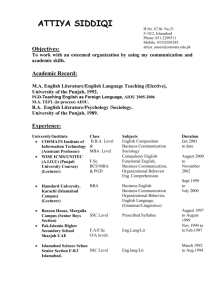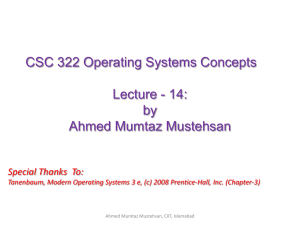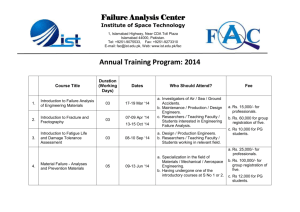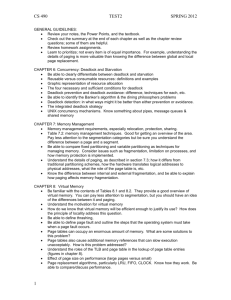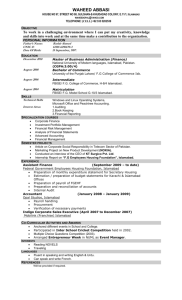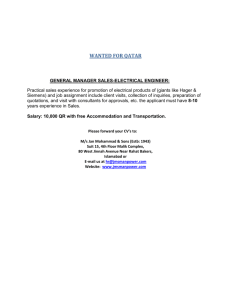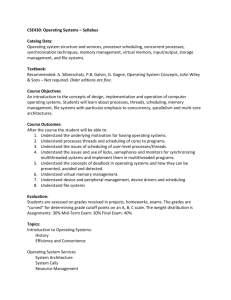CSC322 OS Concepts introduction ver 1.0
advertisement
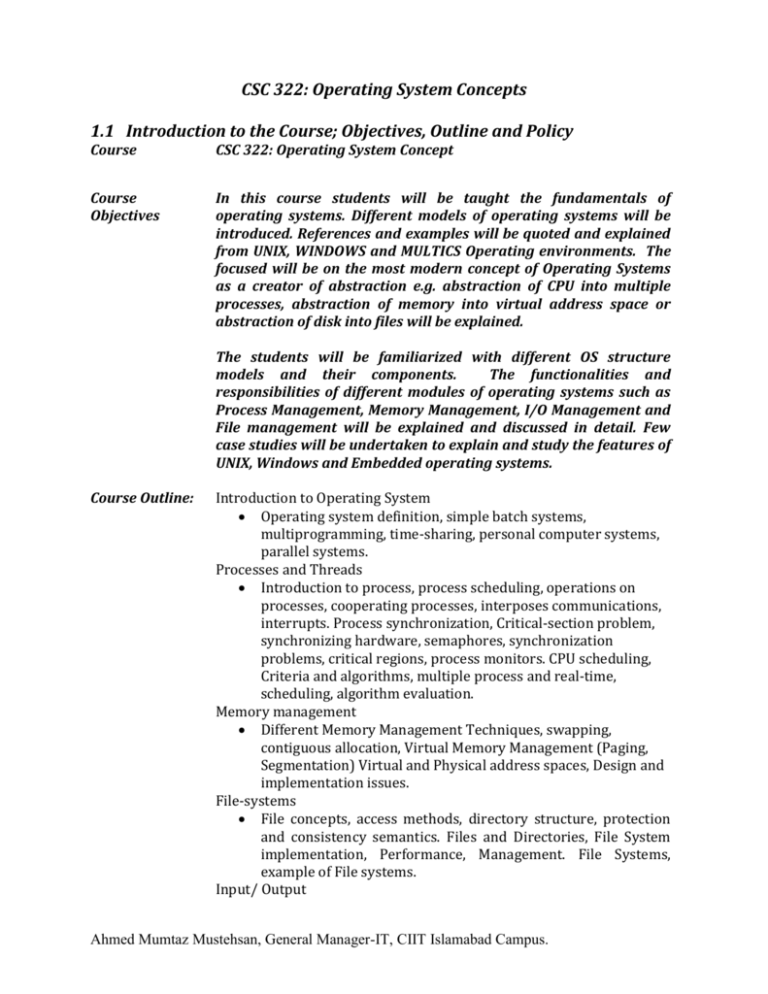
CSC 322: Operating System Concepts 1.1 Introduction to the Course; Objectives, Outline and Policy Course CSC 322: Operating System Concept Course Objectives In this course students will be taught the fundamentals of operating systems. Different models of operating systems will be introduced. References and examples will be quoted and explained from UNIX, WINDOWS and MULTICS Operating environments. The focused will be on the most modern concept of Operating Systems as a creator of abstraction e.g. abstraction of CPU into multiple processes, abstraction of memory into virtual address space or abstraction of disk into files will be explained. The students will be familiarized with different OS structure models and their components. The functionalities and responsibilities of different modules of operating systems such as Process Management, Memory Management, I/O Management and File management will be explained and discussed in detail. Few case studies will be undertaken to explain and study the features of UNIX, Windows and Embedded operating systems. Course Outline: Introduction to Operating System Operating system definition, simple batch systems, multiprogramming, time-sharing, personal computer systems, parallel systems. Processes and Threads Introduction to process, process scheduling, operations on processes, cooperating processes, interposes communications, interrupts. Process synchronization, Critical-section problem, synchronizing hardware, semaphores, synchronization problems, critical regions, process monitors. CPU scheduling, Criteria and algorithms, multiple process and real-time, scheduling, algorithm evaluation. Memory management Different Memory Management Techniques, swapping, contiguous allocation, Virtual Memory Management (Paging, Segmentation) Virtual and Physical address spaces, Design and implementation issues. File-systems File concepts, access methods, directory structure, protection and consistency semantics. Files and Directories, File System implementation, Performance, Management. File Systems, example of File systems. Input/ Output Ahmed Mumtaz Mustehsan, General Manager-IT, CIIT Islamabad Campus. Principles of I/O hardware, Principals of I/O Software, I/O Software Layers, I/O devices, Hard Disk, RAID, CD, DVD, Clock Hardware and Software Deadlocks Characterization and handling of deadlocks, deadlock prevention avoidance and detection, deadlock recovery. Case Studies Case studies of Windows and UNIX/LINUX Operating systems. Text Books: Reference Books: Modern Operating Systems, Andrew S. Tanenbaum, Second Edition, Prentice Hall. Operating System Concepts, by Abraham Silberschatz, Peter B. Galvin Operating Systems Design and Implementation, Andrew S. Tanenbaum, Albert S. Woodhull An Introduction to Operating systems, by H. M. Deitel (Including Case studies in UNIX, OS/2, MS-DOS, VM, Open Systems Policy: Delivery Evaluation and Grading: Delivery: Through 32 Recorded Lectures Evaluation and Grading: Quizzes Assignments 4 4 Midterm Examination 2 • First Sessional • Second Sessional Terminal Examination 1 1 1 10% 15% 10% 15% 50% Ahmed Mumtaz Mustehsan, General Manager-IT, CIIT Islamabad Campus. 1.2 Breakdown of Lecture Topics Lecture No. 01 02 03 04 05 06 07 08 09 10 11 12 13 Topic CHAPTER-1: INTRODUCTION:WHAT IS AN OPERATING SYSTEM? The Operating System as an Extended Machine, The Operating System as a Resource Manager HISTORY OF OPERATING SYSTEMS The First Generation (1945-55), The Second Generation (1955-65) , The Third Generation (1965-1980), Fourth Generation (1980-Present) THE OPERATING SYSTEM ZOO COMPUTER HARDWARE REVIEW, OPERATING SYSTEM CONCEPTS; Processes, Deadlocks, Memory Management, OPERATING SYSTEM CONCEPTS; (continued) Input/Output, I/O (by Polling, Interrupt and DMA) Files, Security, The Shell. OPERATING SYSTEM CONCEPTS; Process Management; System Calls, File System Management and APIs. OPERATING SYSTEM STRUCTURE Monolithic Systems, Layered Systems, Microkernel, Exo-kernels , ClientServer Model, Virtual Machines and Virtual Machines rediscovered. CHAPTER-2: PROCESSES AND THREADS PROCESSES: The Process Model , Process Creation, Process Termination, Process Hierarchies, Process States, Implementation of Processes, Processes and Threads. The Thread Model , Thread Usage, Implementing Threads in User Space, THREADS: Implementing Threads in the Kernel, Hybrid Implementations, Scheduler Activations, Pop up Threads. Making single thread Multithreaded. INTERPROCESS COMMUNICATION Race Conditions , Critical Regions, Mutual Exclusion with Busy Waiting, Sleep and Wakeup, Semaphores, Mutexes, Conditional variables, Monitors, Message Passing, Barriers. SCHEDULING ,Introduction to Scheduling ,Scheduling in Batch Systems, Pre-emptive and Non Pre-emptive scheduling. Different scheduling Algorithms. Scheduling in Interactive Systems, Scheduling in Real-Time Systems, Policy versus Mechanism, Thread Scheduling CHAPTER-3: MEMORY MANAGEMENT : BASIC MEMORY MANAGEMENT: Mono-programming without Swapping, Multiprogramming with Fixed Partitions , Modeling Multiprogramming, Analysis of Multiprogramming System Performance, Relocation and Protection, Contagious Memory. Memory Management with Bitmaps , Memory Management with Linked Lists VIRTUAL MEMORY Management: Paging , Page Tables , Page fault handling, MMU, TLBs (Translation Look-aside Buffers ) , Inverted Page Tables Ahmed Mumtaz Mustehsan, General Manager-IT, CIIT Islamabad Campus. 14 15 16 17 18 19 20 21 22 23 24 25 26 27 28 PAGE REPLACEMENT ALGORITHMS The Optimal Page Replacement Algorithm , The Not Recently Used Page Replacement Algorithm , The First-In, First-Out, The Second Chance Page Replacement Algorithm, The Clock Page Replacement Algorithm, The Least Recently Used, Simulating LRU in Software, The Working Set Page Replacement Algorithm , The WSClock Page Replacement Algorithm ,Summary of Page Replacement Algorithms DESIGN ISSUES FOR PAGING SYSTEMS Local versus Global Allocation Policies , Load Control , Page Size , Separate Instruction and Data Spaces , Shared Pages , Cleaning Policy Virtual Memory Interface IMPLEMENTATION ISSUES: Operating System Involvement with Paging , Page Fault Handling , PERFORMANCE ISSUES: Instruction Backup Locking Pages in Memory Backing Store , Separation of Policy and Mechanism SEGMENTATION: Implementation of Pure Segmentation , Segmentation with Paging: MULTICS , Segmentation with Paging: The Intel Pentium CHAPTER-4: FILE SYSTEMS: FILES; File Naming , File Structure , File Types , File Access , File Attributes , File Operations , An Example Program Using File System Calls , Memory-Mapped Files DIRECTORIES; Single-Level Directory Systems , Two-level Directory Systems , Hierarchical Directory Systems , Path Names , Directory Operations FILE SYSTEM IMPLEMENTATION: File System Layout , allocating Blocks to file, Contiguous allocation, linked allocation, i-nodes allocation. Implementing Directories. Shared Files, i-node problems and solutions, symbolic links, Log-Structured File Systems, Journaling File Systems, Disk space management. Disk space management, (Manage Free Blocks ), Manage Disk quota File System Backups, File System Consistency, File System Performance Examples of File System CHAPTER -5 : INPUT/OUTPUT: PRINCIPLES OF I/O HARDWARE I/O Devices , Device Controllers , Memory-Mapped I/O , Direct Memory Access , Interrupts Revisited, Precise and Imprecise Interrupts PRINCIPLES OF I/O SOFTWARE: Goals of the I/O Software , Programmed I/O , Interrupt-Driven I/O , I/O Using DMA I/O SOFTWARE LAYERS Interrupt Handlers , Device Drivers , Device-Independent I/O Software , User-Space I/O Software DISKS: Disk Hardware , Disk Arm Scheduling Algorithms, Error Handling CD, DVD. Disk RAIDs. CLOCKS : Clock Hardware , Clock Software , Soft Timers CHAPTER- 6: DEADLOCKS: RESOURCES: Preempt able and Non-preemptible Resources , Resource Acquisition, Conditions for Deadlock, Ahmed Mumtaz Mustehsan, General Manager-IT, CIIT Islamabad Campus. 29 30 31 32 Deadlock Modeling , The Ostrich algorithm , DEADLOCK DETECTION AND RECOVERY : Deadlock Detection with One Resource of Each Type, Deadlock Detection with Multiple, Resource of Each Type, Recovery from Deadlock DEADLOCK AVOIDANCE , Resource Trajectories, Safe and Unsafe States, The Banker's Algorithm for a Single Resource, The Banker's Algorithm for Multiple Resources , DEADLOCK PREVENTION :Attacking the Mutual Exclusion Condition’, Attacking the Hold and Wait Condition , Attacking the No Preemption Condition , Attacking the Circular Wait Condition, OTHER ISSUES: Two-Phase Locking , Non-resource Deadlocks, Starvation Case Study; Windows VISTA Case Study; LINUX IT Essentials: Useful Practical Tips regarding the installation, operation and maintenance of an Operating System Ahmed Mumtaz Mustehsan, General Manager-IT, CIIT Islamabad Campus. 1.3 Teacher’s Profile Course Instructor Ahmed Mumtaz Mustehsan General Manager-IT COMSATS Institute of Informational Technology, Islamabad Qualifications: Master in Computer Sciences (1979-81) Quaid-e-Azam university Islamabad. Area of Expertise & Specialization: Experience: Satellite Image Processing and GIS La defance PARIS, France 30 years of experience in the field of IT industry, Education and R & D Served on: Different Reputable Posts at Middle and Top Management at National and International Organizations AS: Scientific Officer, PAEC, Islamabad. In-charge CTC, UGC, COBS, PAEC, H-9, Islamabad System Manager, Jafrana Limited, Canada Manager Data Processing, SUPARCO Director, Satellite Ground Station, SUPARCO Associate Professor, University of Lahore Head Department of Computer Sciences, CIIT General Manager IT, CIIT, Islamabad. Hands on: Development of System software, Information systems and Interactive system. Man machine interface. Assembly , FORTRAN, COBAL, Java and C Languages. Ahmed Mumtaz Mustehsan, General Manager-IT, CIIT Islamabad Campus. 1.4 Schedule for Testing Events The testing components have been prepared. The testing needs to be conducted at a very precise schedule matching with the schedule for the delivery of lectures so that the students may not find any question out of sequence of their learning. The following schedule for conducting assignments, Quizzes and midterm is proposed: S. NO. 1 2. 3. Proposed Testing Event Assignment -1 Quiz -1 Sessional - 1 4. 5. 6. 7. 8. Assignment -2 Quiz -2 Assignment -3 Quiz -3 Sessional - 2 9. 10. Quiz -4 Assignment -4 Proposed Time schedule After Lecture-5 After Lecture-5 or 6 Any Time After Lecture 8 After Lecture-11 After Lecture-11 or 12 After Lecture - 15 After Lecture- 15 or 16 Any Time After Lecture 18 After Lecture- 26 or 27 After Lecture-28 11 Terminal Examination After Lecture 32 Remarks Completion of Chapter-1 Completion of Chapter-2 Middle of Chapter-3 Completion of Chapter-3 Submission not before Lecture No. 29 Make sure that the solution of above testing events have been provided to the students. Ahmed Mumtaz Mustehsan, General Manager-IT, CIIT Islamabad Campus. 1.5 References: Text Books Modern Operating Systems, Andrew S. Tanenbaum, Second Edition, Prentice Hall. Operating System Concepts, by Abraham Silberschatz, Peter B. Galvin Reference Books: Operating Systems Design and Implementation, Andrew S. Tanenbaum, Albert S. Woodhull An Introduction to Operating systems, by H. M. Deitel (Including Case studies in UNIX, OS/2, MS-DOS, VM, Open Systems On-line Reference Material used for the delivery of lectures: Tanenbaum, Modern Operating Systems 3 e, (c) 2008 Prentice-Hall, Inc. www.sju.edu/~ggrevera/cscSystems/cscSystems-3-deadlock.ppt Silberschatz, Galvin and Gagne 2002, Operating System Concepts, Operating Systems (Third Edition) Deitel, Deitel and Choffnes Prentice Hall, 2004, (Chapter-21) S.M. Sarwar, R. Koretsky and S.A. Sarwar, Linux – The Textbook, Addison Wesley. 1st ed, 2002 For lecture slides/material Cisco Networking Academy: IT Essentials; Advance Operating System, chapter 12 Ahmed Mumtaz Mustehsan, General Manager-IT, CIIT Islamabad Campus.
